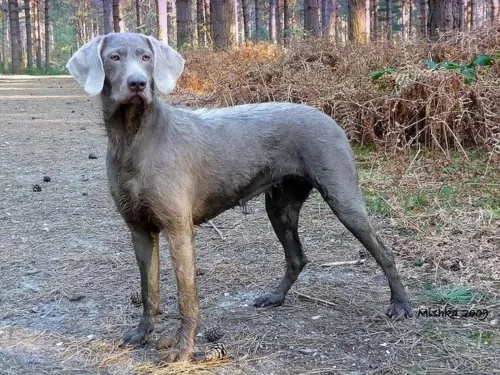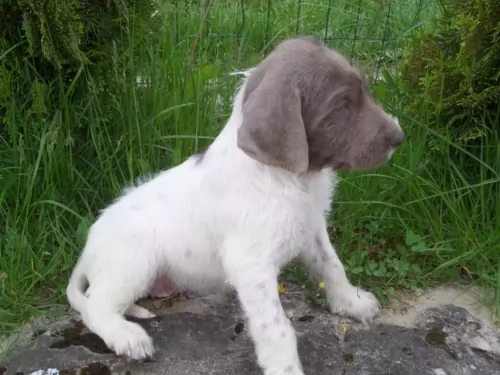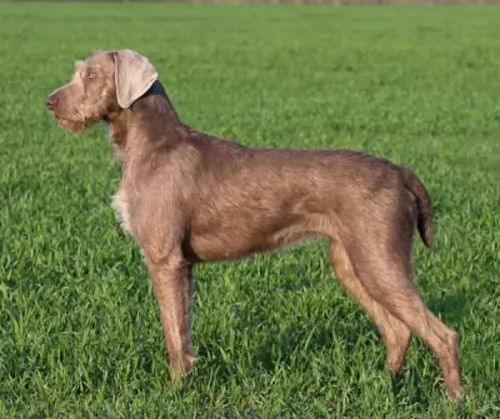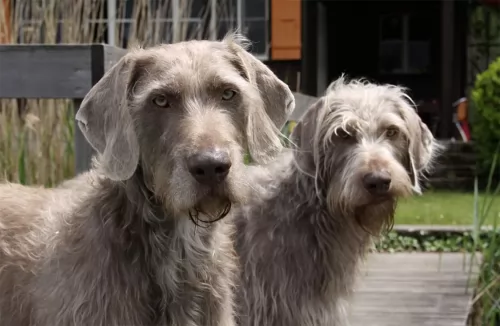 Petzlover
PetzloverHawaiian Poi Dog is originated from Indonesia but Slovensky Hrubosrsty Stavac is originated from Slovakia. Hawaiian Poi Dog may grow 30 cm / 11 inches shorter than Slovensky Hrubosrsty Stavac. Hawaiian Poi Dog may weigh 20 kg / 44 pounds lesser than Slovensky Hrubosrsty Stavac. Hawaiian Poi Dog may live 6 years less than Slovensky Hrubosrsty Stavac. Both Hawaiian Poi Dog and Slovensky Hrubosrsty Stavac has almost same litter size. Both Hawaiian Poi Dog and Slovensky Hrubosrsty Stavac requires Low Maintenance.
The Hawaiian Poi Dog was a descendent of the dogs brought to the Islands by the Polynesian. These Polynesian dogs were themselves descendants of the kuri dog of New Zealand. These kuri dogs were originally from Indonesia. The Hawaiian Poi dog is now extinct but at one time was considered the spiritual protector of Hawaiian children and also used as food by hungry Native Hawaiians.
The dog was called poi which was the word for a food staple mad from the root of Taro and used to put weight on the dogs before they were eaten. Meat was not fed to the dogs because it was too scarce. There was no large mammals to hunt and so the breed was never given a standard. The Poi dog seen by European explorers were short legged, pot bellied canines that lived with the hogs in the towns. Because of what they ate, the dogs were not highly intelligent but were stubborn and hard to train. Because the dogs were not suited for much beyond food and a spiritual charm, they became extinct when the traditional religion was no longer practiced and eating dogs was no longer acceptable. The breed pretty much disappeared by the early 20th century. Very few images of the dogs remain except for ancient petroglyphs.
There was an attempt by the Honolulu Zoo in the late 1960’s to redevelop the breed using local dogs to determine a standard. Then the local dogs were bred as close to the standard as possible. In the third generation one dog was born with the traits of a Poi dog. There was not much more success with this and then the Polynesian ship travel between Tahiti and Hawaii was recreated and a dog taken along.
Today’s mixed breed dogs in Hawaii are called Poi dogs but also have the stubbornness, unique appearance and ability to eat anything it is given like the original Poi. The dogs are small, and should not be confused with the original Poi dogs.
 Breeding of the Slovak Hruborsty Stavac, fondly referred to as the SHS began around the 1940s.
Breeding of the Slovak Hruborsty Stavac, fondly referred to as the SHS began around the 1940s.
There were some dog lovers who were interested in crossing the coarse haired dogs of Slovakia with the German Wirehaired, the Czech blower and the Weimaraner. The outcome was a rough-haired kind of Weimaraner-looking dog.
While hunters and hunting were quite common in Slovakia, the breed became rather rare with the wars when hunting became less, but the dog was reconstructed by breeders, but is still rare outside Slovakia.
As previously mentioned the Poi dog is somewhat unusual in size and shape due to what they ate. They looked somewhat like the native dogs of Polynesia and New Zealand. They have short legs, long bodies, somewhat obese and a very flat head. He had a short smooth coat, in any color or any pattern. They were however mostly brown and they might or might not have white markings.
 The dog is fairly large, standing at between 62 and 68cm in height and weighs 25 - 35kg. The coat is fairly coarse and dense and is a grey/silver shade with a touch of brown.
The dog is fairly large, standing at between 62 and 68cm in height and weighs 25 - 35kg. The coat is fairly coarse and dense and is a grey/silver shade with a touch of brown.
There is quite a bit of hair around the face. The ears are medium length and floppy and the tail is mostly docked to half its length but can be left long as well. The tail is set high and carried vertically and can be well feathered. The eyes are almond-shaped, and the dog has an intelligent appearance to him.
The Slovensky Hruborsty Stavac is a sharp dog, making it easy to have him trained and socialized. He is such a friendly, social dog, getting on well with all family members and loving to get involved with the games of the children.
There is no aggression in this dog and when you provide him with the exercise that he craves, he is loyal, gentle and loving, getting on well with other dogs as well.
The Hawaiian Poi dog was very friendly and good with children
The Poi was considered a good luck charm and a spiritual protector of children
Given what they faced in life, the Poi dog was very adaptable, living anywhere on the islands and eating anything it could find.
Due to their poor diet, the Hawaiian Poi dog was seriously lacking in intelligence and learning ability.
 The Slovensky Hruborsty Stavac is such a bouncy, amicable pet, full of energy. He may appear to be confident and full of the joys but he secretly can’t stand it when his human family don’t include him in everything. He can actually suffer with separation anxiety.
The Slovensky Hruborsty Stavac is such a bouncy, amicable pet, full of energy. He may appear to be confident and full of the joys but he secretly can’t stand it when his human family don’t include him in everything. He can actually suffer with separation anxiety.
He is an athletic dog and will require lots of exercise – walks, hikes, ball games and running off his leash.
He is quiet but strong-willed and will respond well to a strong, firm, consistent, kind owner.
These dogs make the most awesome pets and you can either find one from a rescue group or find a puppy from a reputable breeder. Whatever you decide on, the Slovensky Hruborsty Stavac makes an extraordinary pet.
Probably due to its diet, the Poi dog had several problems to their health. Their poor diet led to a sluggishness both in movement and intelligence. Its development was hampered by a lack of protein. Malnutrition and serious over inbreeding caused a weakness and poor oral hygiene. Due to this lack of teeth and chewing the bones in the dogs heads became flat. The Poi had breathing issues and overall lethargy.
 There are always some illnesses that your dog might get but which isn’t likely with your pet as these are healthy dogs.
There are always some illnesses that your dog might get but which isn’t likely with your pet as these are healthy dogs.
Dogs can die within a few hours if not treated with this ailment. Bloat is a condition where the stomach twists and fills with gas. The stomach is swollen and the gas can cause breathing problems because it puts pressure on the diaphragm. If you suspect that your dog has bloat, he should be rushed to the vet as soon as possible.
With meat being rare in Hawaii, none was available for the dogs. They were fed Poi – from the Taro plant roots. Puppies were fed 2-3 times a day.
The adult dog was fed once or twice a day the same as Poi puppies were fed.
The Hawaiian Poi dog basically has not good health points.
The Poi dog did not need and did not get much exercise, leading to its demise.
 Before you bring your pet home, dog-proof your house. It won’t be fair to leave tempting, chewy things lying around and expect your pet to not be interested in them. Also, keep dangerous chemicals out of reach of your pet.
Before you bring your pet home, dog-proof your house. It won’t be fair to leave tempting, chewy things lying around and expect your pet to not be interested in them. Also, keep dangerous chemicals out of reach of your pet.
Prepare for your pet beforehand and have feeding- and water bowls ready as well as a nice basket or some other sleeping equipment available for him.
If you’re bringing an adult rescue dog home, try to feed him the same kind of food he was already eating, as too many changes can upset him. When he settles down, you can move over to other food. Keeping his food consistent can avoid digestive problems.
If you opt to feed him one of the commercially manufactured dog foods, make sure its the best quality as some of them are bad, filled with things such as colorants, preservatives and fillers. Try and give him some homemade food which you can add into the dry kibble twice a week. Boiled chicken, brown rice or pasta and spinach, sweet potatoes and carrots all boiled slowly together will delight your pet. Chop it all up and your pet will look so forward to this. Dogs thrive on simple, consistent meals like this. Provide water at all times.
The amount of exercise any dog needs is dependent on age, size and energy levels. Because the Slovensky Hruborsty Stavac is an energetic breed, he will need a good dose of exercise. If you have a puppy, avoid strenuous exercise as this can damage the soft, developing bones and joints. As well as walks and ball games, mental stimulation is also important for this dog. Consider buying some puzzle toys or feeders for your pet.
Keep up to date with all your dog’s immunizations and get your pet to the vet as soon as he is sick. There are some illnesses such as bloat which can claim your pet’s life in just a few hours if not attended to.